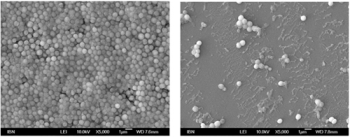Jan 25 2013
Researchers from the Institute of Bioengineering and Nanotechnology (IBN) and IBM Research today unveiled the first-ever antimicrobial hydrogel that can break apart biofilms and destroy multidrug-resistant superbugs upon contact. Tests have demonstrated the effectiveness of this novel synthetic material in eliminating various types of bacteria and fungi that are leading causes of microbial infections, and preventing them from developing antibiotic resistance. This discovery may be used in wound healing, medical device and contact lens coating, skin infection treatment and dental fillings.
 On the left is a mature and healthy MRSA biofilm. After the hydrogel is applied, the biofilm is destroyed as seen on the right. The small portion of cells left has drastically disrupted membrane, preventing resistance. This type of biofilm disruption has not been reported in other antimicrobial hydrogels/synthetic polymers.
On the left is a mature and healthy MRSA biofilm. After the hydrogel is applied, the biofilm is destroyed as seen on the right. The small portion of cells left has drastically disrupted membrane, preventing resistance. This type of biofilm disruption has not been reported in other antimicrobial hydrogels/synthetic polymers.
IBN Executive Director Professor Jackie Y. Ying said, “As a multidisciplinary research institute, IBN believes that effective solutions for complex healthcare problems can only emerge when different fields of expertise come together. Our longstanding partnership with IBM reflects the collaborative creativity across multiple platforms that we aim to foster with leading institutions and organizations. By combining IBN’s biomaterials expertise and IBM’s experience in polymer chemistry, we were able to pioneer the development of a new nanomaterial that can improve medical treatment and help to save lives.”
Dr Yi-Yan Yang, Group Leader at IBN said, “The mutations of bacteria and fungi, and misuse of antibiotics have complicated the treatment of microbial infections in recent years. Our lab is focused on developing effective antimicrobial therapy using inexpensive, biodegradable and biocompatible polymer material. With this new advance, we are able to target the most common and challenging bacterial and fungal diseases, and adapt our polymers for a broad range of applications to combat microbial infections.”
More than 80% of all human microbial infections are related to biofilm. This is particularly challenging for infections associated with the use of medical equipment and devices. Biofilms are microbial cells that can easily colonize on almost any tissue or surface. They contribute significantly to hospital-acquired infections, which are among the top five leading causes of death in the United States and account for US$11 billion in healthcare spending each year.
In Singapore, antimicrobial drug resistance is a major healthcare problem because of the extensive use of antibiotics and medical equipment such as intravascular catheters and orthopedic implants in patients. Once in the body, these instruments become potential breeding grounds for bacterial growth. This provides a continuous source of contamination, which could result in prolonged hospitalization, higher medical costs, and greater risk of death. Research has shown that patients in Singapore with microbial infections were 10.2 times more likely to die during their hospitalization, had 4.6 times longer hospitalization, and incurred 4 times higher hospitalization cost compared to patients with no infections.
The emergence of new strains of superbugs and shortage of new drugs has exacerbated the need for an effective antimicrobial solution. Traditional household antiseptics and disinfectants are also proving to be ineffective in eliminating drug-resistant germs.
Under Dr Yang, IBN’s Nanomedicine group has been conducting research on polymer and peptide nanoparticles as antimicrobial agents since 2007. Her lab has published 15 papers in high-impact factor journals such as Nature Nanotechnology, Nature Chemistry, Nano Today, Advanced Materials, ACS Nano, Biomaterials, and SMALL and filed 10 patents on their antimicrobial technologies.
Recently, Dr Yang’s group and their collaborators from IBM Research co-developed a synthetic gel that is biodegradable, biocompatible and cost-effective. With over 90% water content, the hydrogel is highly flexible and easy to adapt for different uses. This gel can target the bacteria and fungi behind seven of the most common hospital-acquired infections such as MRSA (methicillin-resistant Staphylococcus aureus), VRE (vancomycin-resistant enterococcus), multidrug-resistant Acinetobacter baumannii and Klebsiella pneumoniae, E. coli, Candida albicans and Cryptococcus neoformans fungi.
This new gel is comprised of the novel polymer material jointly developed by IBN and IBM Research in 2010. When mixed with water and heated to body temperature, the polymers form spontaneously into a moldable gel, due to the self-associative interactions between the polymer molecules. This allows the hydrogel to target multidrug-resistant biofilms at various parts of the body and surfaces without being flushed away. Once the antimicrobial function is activated and performed, the biodegradable gel can be naturally eliminated by the body.
Using the new polymer material as a basic building block, IBN can now provide a comprehensive antimicrobial solution to combat drug-resistant bacteria and fungi for a range of medical and consumer products. “Bacterial biofilms are a serious health threat and the ability to disperse such films is critical. The soft consistency of our non-toxic materials makes them ideal for injectable and topical applications as well as coatings and lubricants for medical devices such as catheters,” said Dr James Hedrick, Advanced Organic Materials Scientist, IBM Research. “Whether it’s designing degradable materials to eliminate polymers occupying landfills or new antimicrobial hydrogels that don’t have drug resistance, our partnership with IBN has allowed us to take what the industry has deemed really important and create solutions that are applicable to many technologies in medicine.”